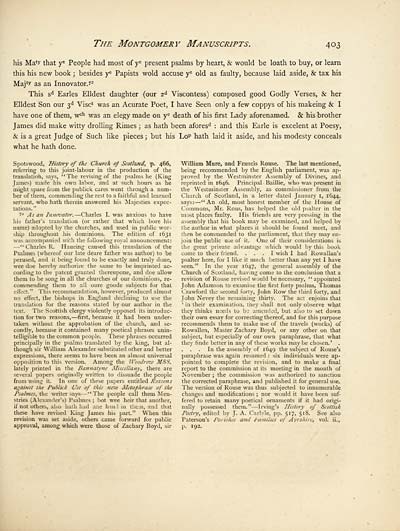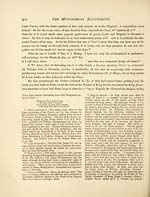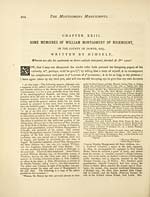Montgomery manuscripts
(417) Page 403
Download files
Complete book:
Individual page:
Thumbnail gallery: Grid view | List view

The Montgomery Manuscripts.
403
his Ma'y that y e People had most of y e present psalms by heart, & would be loath to buy, or learn
this his new book ; besides y e Papists wold accuse y e old as faulty, because laid aside, & tax his
Maj'y as an Innovator, t 2
This s d Earles Elldest daughter (our 2 d Viscontess) composed good Godly Verses, & her
Elldest Son our 3 d Vise' was an Acurate Poet, I have Seen only a few coppys of his makeing & I
have one of them, w ch was an elegy made on y e death of his first Lady aforenamed. & his brother
James did make witty drolling Rimes ; as hath been afores d : and this Earle is excelent at Poesy,
& is a great Judge of Such like pieces ; but his Lop hath laid it aside, and his modesty conceals
what he hath done.
Spotswood, History of the Church oj Scotland, p. 466,
referring to this joint-labour in the production of the
translation, says, "The revising of the psalms he (King
James) made his own labor, and at such hours as he
might spare from the publick cares went through a num-
ber of them, commending the rest to a faithful and learned
servant, wdio hath therein answered his Majesties expec-
tations."
? 2 As an Innovator. — Charles I. was anxious to have
his father's translation (or rather that which bore his
name) adopted by the churches, and used in public wor-
ship throughout his dominions. The edition of 1631
was accompanied with the following royal announcement:
— "Charles R. Haueing caused this translation of the
Psalmes (whereof our late deare father was author) to be
perused, and it being found to be exactly and truly done,
wee doe hereby authorize the same to be imprinted ac-
cording to the patent granted thereupone, and doe allow
them to be song in all the churches of our dominions, re-
commending them to all oure goode subjects for that
effect." This recommendation, however, produced almost
no effect, the bishops in England declining to use the
translation for the reasons stated by our author in the
text. The Scottish clergy violently opposed its introduc-
tion for two reasons, — first, because it had been under-
taken without the approbation of the church, and se-
condly, because it contained many poetical phrases unin-
telligible to the common people. These phrases occurred
principally in the psalms translated by the king, but al-
though sir William Alexander substituted other and better
expressions, there seems to have been an almost universal
opposition to this version. Among the Woodrtni) ffiSS.
lately printed in the Bannatyne Miscellany, there are
several papers originally written to dissuade the people
from using it. In one of these papers entitled Reasons
against the Publick Use of this new Metaphrase of the
Psalmes, the writer says — "The people call them Men-
stries (Alexander's) Psalmes ; bot wee heir that another,
if not others, also hath had ane ban 1 in them, anil that
these have revised King James his part." When this
revision was set aside, others came forward for public
approval, among which were those of Zachary Boyd, sir
William Mure, and Francis Rouse. The last mentioned,
being recommended by the English parliament, was ap-
proved by the Westminster Assembly of Divines, and
reprinted in 1646. Principal Baillie, who was present in
the Westminster Assembly, as commissioner from the
Church of Scotland, in a letter dated January 1, 1644,
says:— "An old, most honest member of the House of
Commons, Mr. Rous, has helped the old psalter in the
most places faulty. His friends are very pressing in the
assembly that his book may be examined, and helped by
the author in what places it should be found meet, and
then be commended to the parliament, that they may en-
join the public use of it. One of their considerations is
tlie great private advantage which would by this book
come to their friend. ... I wish I had Rowallan's
psalter here, for I like it much better than any yet I have
seen." In the year 1647, the general assembly of the
Church of Scotland, having come to the conclusion that a
revision of Rouse revised would be necessary, " appointed
John Adamson to examine the first forty psalms, Thomas
Crawford the second forty, John Row the third forty, and
John Nevey the remaining thirty. The act enjoins that
' in their examination, they shall not only observe what
they thinks needs to bs amended, but also to set down
their own essay for correcting thereof, and for this purpose
recommends them to make use of the travels (works) of
Rowallen, Master Zachary Boyd, or any other on that
subject, but especially of our own paraphrase, that what
the)' finde better in any of these works may be chosen.'
In the assembly of 1649 the subject of Rouse's
paraphrase was again resumed : six individuals were ap-
pointed to complete the revision, and to make a final
report to the commission at its meeting in the month of
November ; the commission was authorized to sanction
the corrected paraphrase, and published it for general use.
The version of Rouse was thus subjected to innumerable
changes and modifications ; nor would it have been suf-
fered to retain many poetical ornaments if it had origi-
nally possessed them." — Irving's History of Scottish
Poetry, edited by J. A. Carlyle, pp. 517, 518. See also
Paterson's Parishes and Pamilies of Ayrshire, vol. ii. ,
p. 192.
403
his Ma'y that y e People had most of y e present psalms by heart, & would be loath to buy, or learn
this his new book ; besides y e Papists wold accuse y e old as faulty, because laid aside, & tax his
Maj'y as an Innovator, t 2
This s d Earles Elldest daughter (our 2 d Viscontess) composed good Godly Verses, & her
Elldest Son our 3 d Vise' was an Acurate Poet, I have Seen only a few coppys of his makeing & I
have one of them, w ch was an elegy made on y e death of his first Lady aforenamed. & his brother
James did make witty drolling Rimes ; as hath been afores d : and this Earle is excelent at Poesy,
& is a great Judge of Such like pieces ; but his Lop hath laid it aside, and his modesty conceals
what he hath done.
Spotswood, History of the Church oj Scotland, p. 466,
referring to this joint-labour in the production of the
translation, says, "The revising of the psalms he (King
James) made his own labor, and at such hours as he
might spare from the publick cares went through a num-
ber of them, commending the rest to a faithful and learned
servant, wdio hath therein answered his Majesties expec-
tations."
? 2 As an Innovator. — Charles I. was anxious to have
his father's translation (or rather that which bore his
name) adopted by the churches, and used in public wor-
ship throughout his dominions. The edition of 1631
was accompanied with the following royal announcement:
— "Charles R. Haueing caused this translation of the
Psalmes (whereof our late deare father was author) to be
perused, and it being found to be exactly and truly done,
wee doe hereby authorize the same to be imprinted ac-
cording to the patent granted thereupone, and doe allow
them to be song in all the churches of our dominions, re-
commending them to all oure goode subjects for that
effect." This recommendation, however, produced almost
no effect, the bishops in England declining to use the
translation for the reasons stated by our author in the
text. The Scottish clergy violently opposed its introduc-
tion for two reasons, — first, because it had been under-
taken without the approbation of the church, and se-
condly, because it contained many poetical phrases unin-
telligible to the common people. These phrases occurred
principally in the psalms translated by the king, but al-
though sir William Alexander substituted other and better
expressions, there seems to have been an almost universal
opposition to this version. Among the Woodrtni) ffiSS.
lately printed in the Bannatyne Miscellany, there are
several papers originally written to dissuade the people
from using it. In one of these papers entitled Reasons
against the Publick Use of this new Metaphrase of the
Psalmes, the writer says — "The people call them Men-
stries (Alexander's) Psalmes ; bot wee heir that another,
if not others, also hath had ane ban 1 in them, anil that
these have revised King James his part." When this
revision was set aside, others came forward for public
approval, among which were those of Zachary Boyd, sir
William Mure, and Francis Rouse. The last mentioned,
being recommended by the English parliament, was ap-
proved by the Westminster Assembly of Divines, and
reprinted in 1646. Principal Baillie, who was present in
the Westminster Assembly, as commissioner from the
Church of Scotland, in a letter dated January 1, 1644,
says:— "An old, most honest member of the House of
Commons, Mr. Rous, has helped the old psalter in the
most places faulty. His friends are very pressing in the
assembly that his book may be examined, and helped by
the author in what places it should be found meet, and
then be commended to the parliament, that they may en-
join the public use of it. One of their considerations is
tlie great private advantage which would by this book
come to their friend. ... I wish I had Rowallan's
psalter here, for I like it much better than any yet I have
seen." In the year 1647, the general assembly of the
Church of Scotland, having come to the conclusion that a
revision of Rouse revised would be necessary, " appointed
John Adamson to examine the first forty psalms, Thomas
Crawford the second forty, John Row the third forty, and
John Nevey the remaining thirty. The act enjoins that
' in their examination, they shall not only observe what
they thinks needs to bs amended, but also to set down
their own essay for correcting thereof, and for this purpose
recommends them to make use of the travels (works) of
Rowallen, Master Zachary Boyd, or any other on that
subject, but especially of our own paraphrase, that what
the)' finde better in any of these works may be chosen.'
In the assembly of 1649 the subject of Rouse's
paraphrase was again resumed : six individuals were ap-
pointed to complete the revision, and to make a final
report to the commission at its meeting in the month of
November ; the commission was authorized to sanction
the corrected paraphrase, and published it for general use.
The version of Rouse was thus subjected to innumerable
changes and modifications ; nor would it have been suf-
fered to retain many poetical ornaments if it had origi-
nally possessed them." — Irving's History of Scottish
Poetry, edited by J. A. Carlyle, pp. 517, 518. See also
Paterson's Parishes and Pamilies of Ayrshire, vol. ii. ,
p. 192.
Set display mode to:
![]() Universal Viewer |
Universal Viewer | ![]() Mirador |
Large image | Transcription
Mirador |
Large image | Transcription
Images and transcriptions on this page, including medium image downloads, may be used under the Creative Commons Attribution 4.0 International Licence unless otherwise stated. ![]()
| Histories of Scottish families > Montgomery manuscripts > (417) Page 403 |
|---|
| Permanent URL | https://digital.nls.uk/95237931 |
|---|
| Description | A selection of almost 400 printed items relating to the history of Scottish families, mostly dating from the 19th and early 20th centuries. Includes memoirs, genealogies and clan histories, with a few produced by emigrant families. The earliest family history goes back to AD 916. |
|---|

